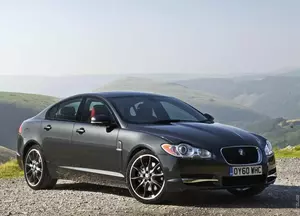
| Vehicle | Precise engine size | Difference from world average | Engine size to consumption ratio | Horsepower from 1 L | Engine size to 100 kg of weight |
|---|---|---|---|---|---|
| 2.0d |
2 L (1999 cc) |
14.8% smaller | 46 cc to 1 mpg | 120 hp from 1 L | 118 cc to 100 kg |
| 3.0d V6 |
2.99 L (2993 cc) |
27.6% bigger | 70 cc to 1 mpg | 100 hp from 1 L | 166 cc to 100 kg |
| S 3.0 V6 |
3 L (2995 cc) |
27.7% bigger | 111 cc to 1 mpg | 127 hp from 1 L | 166 cc to 100 kg |
| 3.0 V6 |
3 L (2995 cc) |
27.7% bigger | 107 cc to 1 mpg | 113 hp from 1 L | 176 cc to 100 kg |
| 2.0 |
2 L (1997 cc) |
14.9% smaller | 61 cc to 1 mpg | 150 hp from 1 L | 117 cc to 100 kg |
| 30t |
2 L (1997 cc) |
14.9% smaller | 64 cc to 1 mpg | 150 hp from 1 L | 117 cc to 100 kg |
| 25t |
2 L (1997 cc) |
14.9% smaller | 61 cc to 1 mpg | 125 hp from 1 L | 125 cc to 100 kg |
| 30d V6 |
2.99 L (2993 cc) |
27.6% bigger | 75 cc to 1 mpg | 100 hp from 1 L | 166 cc to 100 kg |
| 25d |
2 L (1999 cc) |
14.8% smaller | 48 cc to 1 mpg | 120 hp from 1 L | 118 cc to 100 kg |
| 20d |
2 L (1999 cc) |
14.8% smaller | 41 cc to 1 mpg | 90 hp from 1 L | 125 cc to 100 kg |
| E-Performance 2.0d |
2 L (1999 cc) |
14.8% smaller | 40 cc to 1 mpg | 82 hp from 1 L | 125 cc to 100 kg |
| Vehicle | 2.0d |
|---|---|
| Precise engine size | 2 L (1999 cc) |
| Difference from world average | 14.8 smaller |
| Engine size to consumption ratio | 46 cc to 1 mpg |
| Horsepower from 1 L | 120 hp from 1 L |
| Engine size to 100 kg of weight | 118 cc to 100 kg |
| Vehicle | 3.0d V6 |
| Precise engine size | 2.99 L (2993 cc) |
| Difference from world average | 27.6 bigger |
| Engine size to consumption ratio | 70 cc to 1 mpg |
| Horsepower from 1 L | 100 hp from 1 L |
| Engine size to 100 kg of weight | 166 cc to 100 kg |
| Vehicle | S 3.0 V6 |
| Precise engine size | 3 L (2995 cc) |
| Difference from world average | 27.7 bigger |
| Engine size to consumption ratio | 111 cc to 1 mpg |
| Horsepower from 1 L | 127 hp from 1 L |
| Engine size to 100 kg of weight | 166 cc to 100 kg |
| Vehicle | 3.0 V6 |
| Precise engine size | 3 L (2995 cc) |
| Difference from world average | 27.7 bigger |
| Engine size to consumption ratio | 107 cc to 1 mpg |
| Horsepower from 1 L | 113 hp from 1 L |
| Engine size to 100 kg of weight | 176 cc to 100 kg |
| Vehicle | 2.0 |
| Precise engine size | 2 L (1997 cc) |
| Difference from world average | 14.9 smaller |
| Engine size to consumption ratio | 61 cc to 1 mpg |
| Horsepower from 1 L | 150 hp from 1 L |
| Engine size to 100 kg of weight | 117 cc to 100 kg |
| Vehicle | 30t |
| Precise engine size | 2 L (1997 cc) |
| Difference from world average | 14.9 smaller |
| Engine size to consumption ratio | 64 cc to 1 mpg |
| Horsepower from 1 L | 150 hp from 1 L |
| Engine size to 100 kg of weight | 117 cc to 100 kg |
| Vehicle | 25t |
| Precise engine size | 2 L (1997 cc) |
| Difference from world average | 14.9 smaller |
| Engine size to consumption ratio | 61 cc to 1 mpg |
| Horsepower from 1 L | 125 hp from 1 L |
| Engine size to 100 kg of weight | 125 cc to 100 kg |
| Vehicle | 30d V6 |
| Precise engine size | 2.99 L (2993 cc) |
| Difference from world average | 27.6 bigger |
| Engine size to consumption ratio | 75 cc to 1 mpg |
| Horsepower from 1 L | 100 hp from 1 L |
| Engine size to 100 kg of weight | 166 cc to 100 kg |
| Vehicle | 25d |
| Precise engine size | 2 L (1999 cc) |
| Difference from world average | 14.8 smaller |
| Engine size to consumption ratio | 48 cc to 1 mpg |
| Horsepower from 1 L | 120 hp from 1 L |
| Engine size to 100 kg of weight | 118 cc to 100 kg |
| Vehicle | 20d |
| Precise engine size | 2 L (1999 cc) |
| Difference from world average | 14.8 smaller |
| Engine size to consumption ratio | 41 cc to 1 mpg |
| Horsepower from 1 L | 90 hp from 1 L |
| Engine size to 100 kg of weight | 125 cc to 100 kg |
| Vehicle | E-Performance 2.0d |
| Precise engine size | 2 L (1999 cc) |
| Difference from world average | 14.8 smaller |
| Engine size to consumption ratio | 40 cc to 1 mpg |
| Horsepower from 1 L | 82 hp from 1 L |
| Engine size to 100 kg of weight | 125 cc to 100 kg |

| Vehicle | Precise engine size | Difference from world average | Engine size to consumption ratio | Horsepower from 1 L | Engine size to 100 kg of weight |
|---|---|---|---|---|---|
| 2.0d |
2 L (1999 cc) |
14.8% smaller | 43 cc to 1 mpg | 90 hp from 1 L | 111 cc to 100 kg |
| 3.0 V6 |
3 L (2995 cc) |
27.7% bigger | - | 127 hp from 1 L | 166 cc to 100 kg |
| 2.0 |
2 L (1997 cc) |
14.9% smaller | 57 cc to 1 mpg | 125 hp from 1 L | 117 cc to 100 kg |
| 3.0d V6 |
2.99 L (2993 cc) |
27.6% bigger | 73 cc to 1 mpg | 100 hp from 1 L | 158 cc to 100 kg |
| 30t |
2 L (1997 cc) |
14.9% smaller | 64 cc to 1 mpg | 150 hp from 1 L | 111 cc to 100 kg |
| 25t |
2 L (1997 cc) |
14.9% smaller | 64 cc to 1 mpg | 125 hp from 1 L | 117 cc to 100 kg |
| 30d V6 |
2.99 L (2993 cc) |
27.6% bigger | 77 cc to 1 mpg | 100 hp from 1 L | 166 cc to 100 kg |
| 25d |
2 L (1999 cc) |
14.8% smaller | 50 cc to 1 mpg | 120 hp from 1 L | 111 cc to 100 kg |
| E-Performance 2.0d |
2 L (1999 cc) |
14.8% smaller | 43 cc to 1 mpg | 82 hp from 1 L | 118 cc to 100 kg |
| 20d |
2 L (1999 cc) |
14.8% smaller | 45 cc to 1 mpg | 90 hp from 1 L | 118 cc to 100 kg |
| Vehicle | 2.0d |
|---|---|
| Precise engine size | 2 L (1999 cc) |
| Difference from world average | 14.8 smaller |
| Engine size to consumption ratio | 43 cc to 1 mpg |
| Horsepower from 1 L | 90 hp from 1 L |
| Engine size to 100 kg of weight | 111 cc to 100 kg |
| Vehicle | 3.0 V6 |
| Precise engine size | 3 L (2995 cc) |
| Difference from world average | 27.7 bigger |
| Engine size to consumption ratio | - |
| Horsepower from 1 L | 127 hp from 1 L |
| Engine size to 100 kg of weight | 166 cc to 100 kg |
| Vehicle | 2.0 |
| Precise engine size | 2 L (1997 cc) |
| Difference from world average | 14.9 smaller |
| Engine size to consumption ratio | 57 cc to 1 mpg |
| Horsepower from 1 L | 125 hp from 1 L |
| Engine size to 100 kg of weight | 117 cc to 100 kg |
| Vehicle | 3.0d V6 |
| Precise engine size | 2.99 L (2993 cc) |
| Difference from world average | 27.6 bigger |
| Engine size to consumption ratio | 73 cc to 1 mpg |
| Horsepower from 1 L | 100 hp from 1 L |
| Engine size to 100 kg of weight | 158 cc to 100 kg |
| Vehicle | 30t |
| Precise engine size | 2 L (1997 cc) |
| Difference from world average | 14.9 smaller |
| Engine size to consumption ratio | 64 cc to 1 mpg |
| Horsepower from 1 L | 150 hp from 1 L |
| Engine size to 100 kg of weight | 111 cc to 100 kg |
| Vehicle | 25t |
| Precise engine size | 2 L (1997 cc) |
| Difference from world average | 14.9 smaller |
| Engine size to consumption ratio | 64 cc to 1 mpg |
| Horsepower from 1 L | 125 hp from 1 L |
| Engine size to 100 kg of weight | 117 cc to 100 kg |
| Vehicle | 30d V6 |
| Precise engine size | 2.99 L (2993 cc) |
| Difference from world average | 27.6 bigger |
| Engine size to consumption ratio | 77 cc to 1 mpg |
| Horsepower from 1 L | 100 hp from 1 L |
| Engine size to 100 kg of weight | 166 cc to 100 kg |
| Vehicle | 25d |
| Precise engine size | 2 L (1999 cc) |
| Difference from world average | 14.8 smaller |
| Engine size to consumption ratio | 50 cc to 1 mpg |
| Horsepower from 1 L | 120 hp from 1 L |
| Engine size to 100 kg of weight | 111 cc to 100 kg |
| Vehicle | E-Performance 2.0d |
| Precise engine size | 2 L (1999 cc) |
| Difference from world average | 14.8 smaller |
| Engine size to consumption ratio | 43 cc to 1 mpg |
| Horsepower from 1 L | 82 hp from 1 L |
| Engine size to 100 kg of weight | 118 cc to 100 kg |
| Vehicle | 20d |
| Precise engine size | 2 L (1999 cc) |
| Difference from world average | 14.8 smaller |
| Engine size to consumption ratio | 45 cc to 1 mpg |
| Horsepower from 1 L | 90 hp from 1 L |
| Engine size to 100 kg of weight | 118 cc to 100 kg |

| Vehicle | Precise engine size | Difference from world average | Engine size to consumption ratio | Horsepower from 1 L | Engine size to 100 kg of weight |
|---|---|---|---|---|---|
| 2.2d |
2.18 L (2179 cc) |
7.1% smaller | 47 cc to 1 mpg | 92 hp from 1 L | - |
| 3.0d |
2.99 L (2993 cc) |
27.6% bigger | 77 cc to 1 mpg | 92 hp from 1 L | - |
| Vehicle | 2.2d |
|---|---|
| Precise engine size | 2.18 L (2179 cc) |
| Difference from world average | 7.1 smaller |
| Engine size to consumption ratio | 47 cc to 1 mpg |
| Horsepower from 1 L | 92 hp from 1 L |
| Engine size to 100 kg of weight | - |
| Vehicle | 3.0d |
| Precise engine size | 2.99 L (2993 cc) |
| Difference from world average | 27.6 bigger |
| Engine size to consumption ratio | 77 cc to 1 mpg |
| Horsepower from 1 L | 92 hp from 1 L |
| Engine size to 100 kg of weight | - |

| Vehicle | Precise engine size | Difference from world average | Engine size to consumption ratio | Horsepower from 1 L | Engine size to 100 kg of weight |
|---|---|---|---|---|---|
| 2.0 |
2 L (1999 cc) |
14.8% smaller | 69 cc to 1 mpg | 120 hp from 1 L | 118 cc to 100 kg |
| 2.2d |
2.18 L (2179 cc) |
7.1% smaller | 50 cc to 1 mpg | 87 hp from 1 L | - |
| 3.0 V6 |
2.97 L (2967 cc) |
26.5% bigger | 135 cc to 1 mpg | 80 hp from 1 L | 175 cc to 100 kg |
| R-S 5.0 V8 |
5 L (5000 cc) |
113.1% bigger | 250 cc to 1 mpg | 110 hp from 1 L | 263 cc to 100 kg |
| 3.0d V6 |
2.99 L (2993 cc) |
27.6% bigger | 77 cc to 1 mpg | 92 hp from 1 L | 166 cc to 100 kg |
| 5.0 V8 |
5 L (5000 cc) |
113.1% bigger | 238 cc to 1 mpg | 77 hp from 1 L | 278 cc to 100 kg |
| R 5.0 V8 |
5 L (5000 cc) |
113.1% bigger | 250 cc to 1 mpg | 102 hp from 1 L | 263 cc to 100 kg |
| Vehicle | 2.0 |
|---|---|
| Precise engine size | 2 L (1999 cc) |
| Difference from world average | 14.8 smaller |
| Engine size to consumption ratio | 69 cc to 1 mpg |
| Horsepower from 1 L | 120 hp from 1 L |
| Engine size to 100 kg of weight | 118 cc to 100 kg |
| Vehicle | 2.2d |
| Precise engine size | 2.18 L (2179 cc) |
| Difference from world average | 7.1 smaller |
| Engine size to consumption ratio | 50 cc to 1 mpg |
| Horsepower from 1 L | 87 hp from 1 L |
| Engine size to 100 kg of weight | - |
| Vehicle | 3.0 V6 |
| Precise engine size | 2.97 L (2967 cc) |
| Difference from world average | 26.5 bigger |
| Engine size to consumption ratio | 135 cc to 1 mpg |
| Horsepower from 1 L | 80 hp from 1 L |
| Engine size to 100 kg of weight | 175 cc to 100 kg |
| Vehicle | R-S 5.0 V8 |
| Precise engine size | 5 L (5000 cc) |
| Difference from world average | 113.1 bigger |
| Engine size to consumption ratio | 250 cc to 1 mpg |
| Horsepower from 1 L | 110 hp from 1 L |
| Engine size to 100 kg of weight | 263 cc to 100 kg |
| Vehicle | 3.0d V6 |
| Precise engine size | 2.99 L (2993 cc) |
| Difference from world average | 27.6 bigger |
| Engine size to consumption ratio | 77 cc to 1 mpg |
| Horsepower from 1 L | 92 hp from 1 L |
| Engine size to 100 kg of weight | 166 cc to 100 kg |
| Vehicle | 5.0 V8 |
| Precise engine size | 5 L (5000 cc) |
| Difference from world average | 113.1 bigger |
| Engine size to consumption ratio | 238 cc to 1 mpg |
| Horsepower from 1 L | 77 hp from 1 L |
| Engine size to 100 kg of weight | 278 cc to 100 kg |
| Vehicle | R 5.0 V8 |
| Precise engine size | 5 L (5000 cc) |
| Difference from world average | 113.1 bigger |
| Engine size to consumption ratio | 250 cc to 1 mpg |
| Horsepower from 1 L | 102 hp from 1 L |
| Engine size to 100 kg of weight | 263 cc to 100 kg |